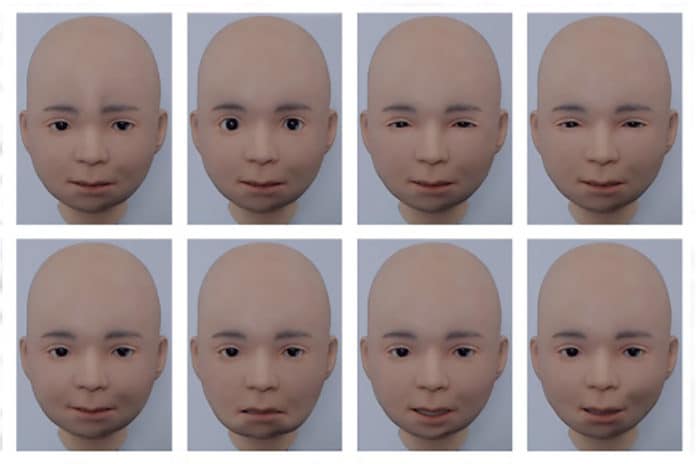Android robots capable of emotional interactions with humans have considerable potential for application to research. While several studies developed androids that can exhibit human-like emotional facial expressions, few have empirically validated androids’ facial expressions.
Researchers from the RIKEN Guardian Robot Project in Japan have created an android child called Nikola capable of successfully displaying six basic emotions – happiness, sadness, fear, anger, surprise, and disgust – generated by moving “muscles” in its face. The android head looks like a hairless boy.
Inside Nikola’s face are 29 pneumatic actuators that control the movements of artificial muscles. In addition, six actuators are used to control head and eye movements, making it even more life-like. These pneumatic actuators are controlled by air pressure, which makes the movements silent and smooth.
The team placed the actuators based on the Facial Action Coding System (FACS), which has been used extensively to study facial expressions. Past research has identified numerous facial actions – such as ‘cheek raiser’ and ‘lip pucker’ – that comprise typical emotions such as happiness or disgust, and the researchers incorporated these action units in Nikola’s design.
To see if people could correctly recognize the robot’s facial expressions, the researchers had a group of people watch Nikola and identify which emotions it was displaying. They found that the participants were able to recognize these six emotions, albeit to varying accuracies. Some emotions were easier to understand than others. This is because Nikola’s silicone skin is less elastic than real human skin and cannot form wrinkles very well. Thus, emotions like disgust were harder to identify because the action unit for nose wrinkling could not be included.
“In the short term, androids like Nikola can be important research tools for social psychology or even social neuroscience,” says lead researcher Wataru Sato from the RIKEN Guardian Robot Project. “Compared with human confederates, androids are good at controlling behaviors and can facilitate rigorous empirical investigation of human social interactions.”
While Nikola still lacks a body, the ultimate goal of the Guardian Robot Project is to build an android that can assist people, particularly those which physical needs who might live alone. “Androids that can emotionally communicate with us will be useful in a wide range of real-life situations, such as caring for older people, and can promote human wellbeing,” says Sato.
